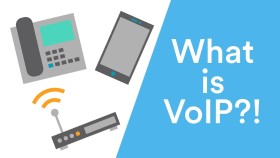Everything you need to know about VoIP
When the internet first entered the home, it was mostly used to browse emails and websites. However, as technology has advanced, the internet has become a powerful resource that has changed our lives in many ways. The most important changes have to do with the way we communicate. Most of us don't use landlines anymore these days. Instead, we use VoIP (Voice over Internet Protocol) to make calls from our computer or smartphone. VoIP also opens up a whole new world for users. If you're trying to figure out if you should use VoIP or how to set it up, this is your guide.
What is VoIP?

VoIP (Voice over Internet Protocol) is a method of converting analog audio signals, such as those heard when making phone calls, into digital data that can be transmitted over the Internet. While most people think that VoIP requires high-speed internet access, this is not the case. Any broadband connection will do, even a dial-up connection. In other words, VoIP lets you make phone calls using the same connection you use to browse the web and stream YouTube.
The technology isn't new: VoIP has been around since the 1990s, but it wasn't until the last few years that it became a practical option for home users. Thanks to faster internet speeds and cheaper prices; VoIP services are now cheaper and more reliable than ever.
Features of VoIP

VoIP works much like a regular phone line, with one big difference: instead of transmitting your voice by plugging a phone line directly into a phone jack, it works through your home computer network. This means that while traditional telephones use only the copper wires on the walls of your house, VoIP uses your existing internet connection in your home. The VoIP service provider establishes the entire connection between the participants. This is also known as IP telephony or Internet telephony.
Advantages of VoIP
VoIP offers many advantages over analog systems. On the one hand, it is cheaper. Businesses can save on network costs because VoIP uses your existing Internet connection instead of traditional phone service. Also, there are no extra charges such as long distance and international calls.
Another big advantage is mobility. With VoIP, employees can use their business numbers anytime, anywhere on any device. You can also set up custom call forwarding rules. This allows employees to stay in touch with customers at all times, even when they are out of the office or traveling abroad.
Take away
VoIP has been around long enough that you might feel like you've heard it before. But once you dig into the technology, these systems promise far more than just letting you make phone calls on your computer. From turning an entire laptop or desktop computer into an office phone, to getting rid of those pesky cell phone bills, VoIP is changing the way we look at telephony. If your business has outgrown its current phone system, or if you're looking for a cost-effective communication solution for your home, then VoIP may be the safest option!










